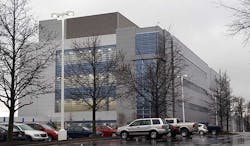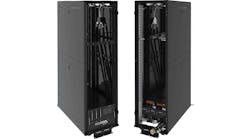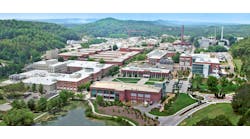RESTON, Virginia – CoreSite has gotten the go-ahead to add 100 megawatts of data center capacity in Northern Virginia, providing expansion capacity in the world’s largest cloud computing hub, the company said this week.
The milestone will allow the colocation and wholesale data center provider to move ahead with the redevelopment of the former Sunrise Technology Park in Reston, an office park CoreSite purchased in 2016.
The CoreSite Reston project highlights two construction trends driven by the growth of cloud computing. As data centers become a more common feature in urban and suburban landscapes, developers are building taller facilities, seeking to deploy as much capacity on the available land. These projects increasingly feature the demolition of of existing office buildings to make way for servers and storage.
CoreSite has been on the front lines of both these trends. The company focuses on large business markets, with major operations in Los Angeles, Chicago, New York and Washington, D.C. As a result, it has gained expertise in “infill” development that creates large data centers in the midst of active business districts.
The Reston expansion is a good example. CoreSite kicked off the project by repurposing several existing buildings on the Sunrise Technology Park, a 22-acre office park that housed four buildings totaling 315,000 square feet. The park is part of a busy office and industrial corridor adjacent to Dulles Airport and the Reston Metro station.
More Room for the Cloud Boom
The new campus will provide CoreSite with space to expand its Reston data center operations, as the Sunrise property is just a quarter mile from the company’s existing campus, which is nearing capacity. CoreSite’s existing campus includes two facilities (VA1 and VA2) totaling over 390,000 square feet of data center capacity, with more than 175 customers, including 35 networks and over 50 cloud and IT service providers.
“Our type of data center campus provides a unique community in which regional technology companies and enterprises with digital services can grow and scale rapidly,” said Juan Font, Senior Vice President of General Management of CoreSite.
The company initially envisioned creating about 660,000 square feet of space at the new campus. It has since expanded its vision for the site, perhaps prompted by the spectacular growth of cloud computing in Northern Virginia, where data center providers leased a record 115 megawatts of capacity last year.
On July 31 the Fairfax County Board of Supervisors approved CoreSite’s expanded site plan, clearing the way for it to create more than 900,000 square feet of data center space. The first phase of data center capacity (VA3) will open in early 2019, and feature 21 megawatts (MWs) or capacity at completion. A second phase of VA3 will add another 27 MWs.
CoreSite will demolish several existing buildings to make way for the following phases, with an option to create a single new structure or a series of structures. Either approach would yield an additional 289,000 square feet, or approximately 50 MWs of additional space.
Building Up Data Centers
The new buildings can be as tall as three stories, and the campus will be anchored by a four-story infrastructure tower, which will centralize most of the cooling and electrical equipment, such as generators. Consolidating the mechanical and electrical infrastructure allows CoreSite to allocate more square footage for raised-floor data center space in the other structures on the campus.
Multi-story data centers allow developers to boost capacity to house IT gear by adding vertical space. While it’s hardly a revolutionary concept for office space, the largest cloud data centers have typically employed a single-story design that spreads horizontally, prompting hyperscale players like Google and Facebook to build data centers in rural areas of Oregon and North Carolina. in 2015, Google shifted to a multi-story model, building four-story data centers in Iowa and Oklahoma.
The trend is most pronounced in the two hottest data center markets, Northern Virginia and Silicon Valley, where it’s becoming more difficult to find development sites for new construction projects. CoreSite has relevant experience in both markets, building a five-story data center in Reston, as well as the first four-story data center in Santa Clara, Calif. The company is currently in the process of razing an existing structure to make way for a new multi-story data center adjacent to its Santa Clara campus.
Mastering the Development Timeline
CoreSite’s strategy is to develop multi-tenant ecosystems in major markets, creating a campus environment with multiple facilities operating as one. That often involves making the most of infill locations – parcels of land in close proximity to its existing data centers. In major markets with limited development sites, that may mean working with smaller pieces of land and building vertically.
It also means acquiring sites with existing structures to be remodeled or razed, which typically involves more approvals and permitting than a “greenfield” build on open land. That can mean a slightly longer development process in these markets. As large cloud customers seek to accelerate their deployment of servers, many are seeking shorter timelines for the delivery of new data center capacity.
All of which underscores the importance of planning for growth in crowded, sometimes complicated major markets.
“It’s pretty typical for these types of permitting environments,” said CoreSite President and CEO Paul Szurek on the company’s recent earnings call. “We’re building in infill markets with much stricter permitting processes, and generally understaffed government agencies. In the long-term that creates a lot of the value in these markets, but it does make the short-term permitting harder to predict.
“I want to give credit to our development and construction team for being very proactive and getting us within the ranges that we’ve originally set,” Szurek added.
Most of Northern Virginia’s data center capacity is distributed across Loudoun and Prince William counties, which are home to nearly 100 data centers and more than 10 million square feet of data center space. CoreSite is the largest data center player in Fairfax County, and local officials see its expansion as important to the county’s economic development. While data center growth has prompted local controversies in Prince William and Loudoun counties, the Fairfax County planning commission gave unanimous approval to CoreSite’s revised plan.
“I think it’s critical to have features like this in the Dulles Corridor if you want a real high-tech corridor and want those high-tech businesses to work,” said commissioner John Carter.






